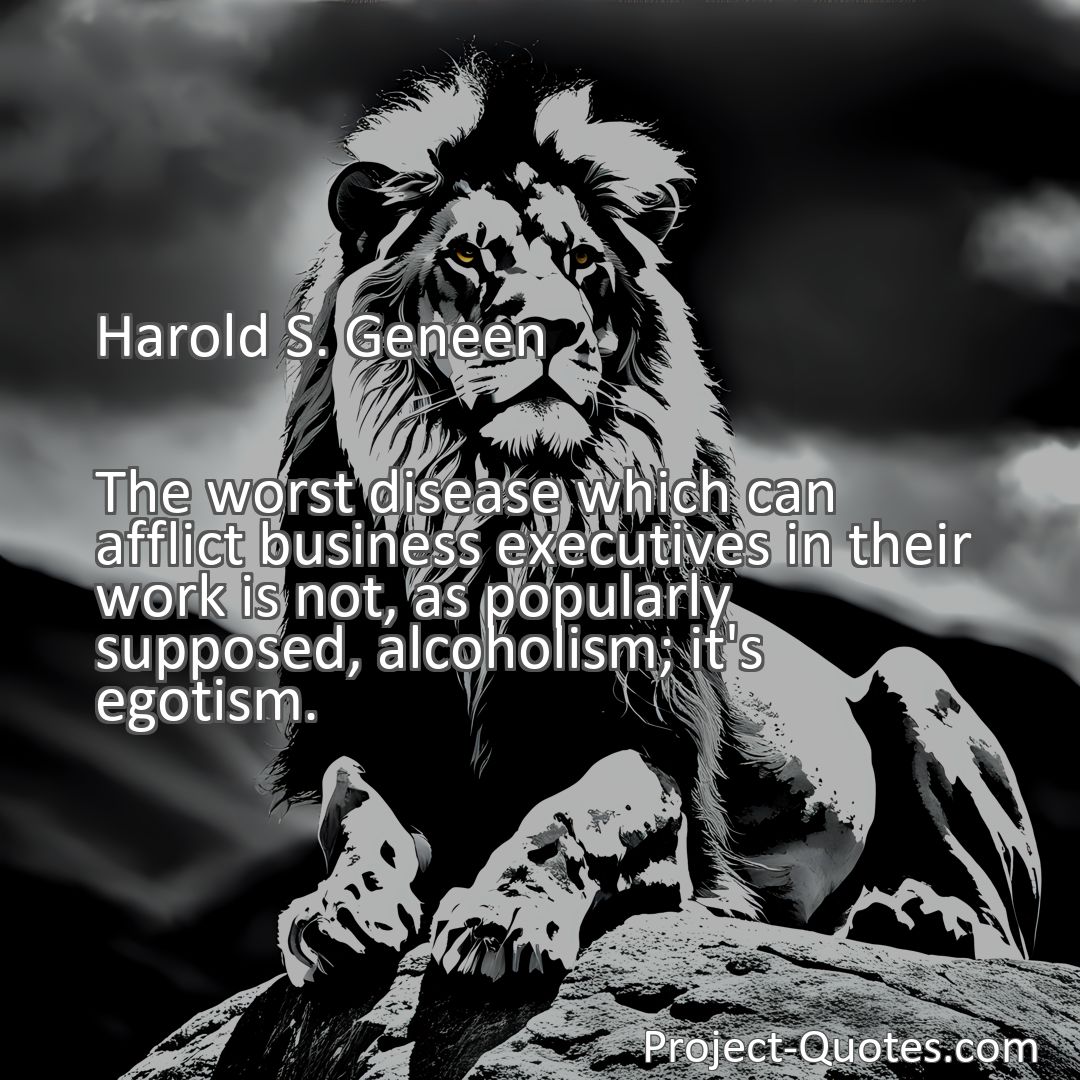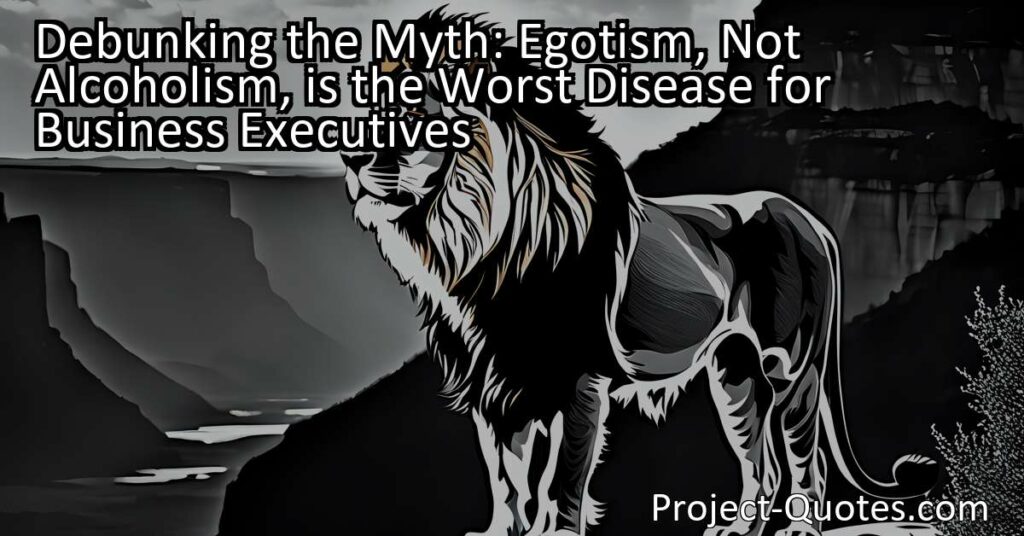The worst disease which can afflict business executives in their work is not, as popularly supposed, alcoholism; it’s egotism.
Harold S. Geneen
Debunking the Myth: Egotism, Not Alcoholism, is the Worst Disease for Business Executives Egotism, or excessive self-importance, is a far more damaging disease for business executives than alcoholism. It can cloud judgment, hinder decision-making, create a toxic work environment, and lead to unethical behavior. To counteract these negative effects, organizations must prioritize humility, self-awareness, and ethical behavior among their leaders.
Table of Contents
- 1 The worst disease which can afflict business executives in their work is not, as popularly supposed, alcoholism; it’s egotism.
- 2 Harold S. Geneen
- 3 Meaning of Quote – The worst disease which can afflict business executives in their work is not, as popularly supposed, alcoholism; it’s egotism.
- 4 Freely Shareable Quote Image
- 5 Related
Meaning of Quote – The worst disease which can afflict business executives in their work is not, as popularly supposed, alcoholism; it’s egotism.
In the fast-paced world of business, there are many challenges that can hinder the success of executives. It is often thought that alcoholism is one of the major obstacles faced by these professionals. However, a closer look reveals that there is a far more damaging disease that can afflict business executives in their work: egotism.
Egotism, or excessive self-centeredness and self-importance, can have devastating effects on the individuals who possess it and the organizations they lead. This particular trait can distort their judgment, hinder effective decision-making, and ultimately lead to the downfall of their businesses.
One of the most detrimental aspects of egotism is its ability to cloud judgment. When executives are too focused on their own self-interests and personal glorification, they may lose sight of the bigger picture. They become more concerned with boosting their own ego rather than making rational decisions that benefit the company as a whole. This can result in poor choices that harm the organization and its stakeholders.
Furthermore, egotism can hinder effective decision-making. Business leaders should be open to receiving input from others and taking into account different perspectives. However, an egotistical individual may downplay the ideas and contributions of others, believing that they alone possess the ultimate solutions. This closed-mindedness can limit the potential for innovation and creativity within the organization. It stifles collaboration and prevents the exploration of alternative approaches that could lead to better outcomes.
In addition to hindering judgment and decision-making, egotism can also create a toxic work environment. When executives prioritize their own needs over those of their employees, it fosters a culture of self-interest rather than teamwork and cooperation. This can lead to a lack of employee engagement and motivation, hindering productivity and overall performance.
Moreover, egotism often comes hand in hand with a lack of empathy and emotional intelligence. Executives who are solely focused on their own success may disregard the feelings and needs of others. This can create an atmosphere of distrust, low morale, and even resistance among employees. When leaders fail to connect with their team members on a personal level, they miss out on valuable opportunities to build strong relationships, foster loyalty, and inspire their workforce.
Another consequence of egotism is the potential for unethical behavior. When business executives are driven solely by their own self-interests, they may be more likely to engage in fraudulent activities, misuse company resources, or disregard ethical standards. This can tarnish the reputation of the organization and lead to legal implications, not to mention the negative impact on employee morale and customer trust.
To combat the detrimental effects of egotism in the workplace, businesses must prioritize the cultivation of humility and self-awareness among their leaders. Executives should be encouraged to recognize their own limitations, seek feedback from others, and be willing to admit and learn from their mistakes. Creating a culture that values teamwork, collaboration, and open communication can help counteract the negative impacts of egotism.
In addition, leadership development programs that focus on emotional intelligence and empathy can play a crucial role in mitigating egotism. By teaching executives to understand and connect with the emotions and experiences of others, these programs equip them with the skills necessary to build strong relationships, motivate employees, and make ethical decisions.
Furthermore, organizations can implement systems and structures that encourage accountability and transparency. By establishing checks and balances, businesses can prevent the unchecked power and ego-driven actions of individuals from causing irreversible damage. Regular performance evaluations, team feedback sessions, and ethical guidelines can help keep egotism in check and ensure that leaders are held accountable.
In conclusion, while alcoholism is often seen as the worst disease that can afflict business executives, it is egotism that poses the greatest threat. Egotistical behavior and excessive self-importance can cloud judgment, hinder effective decision-making, create a toxic work environment, and lead to unethical behavior. To counteract these detrimental effects, organizations must prioritize the cultivation of humility, self-awareness, emotional intelligence, and ethical behavior among their leaders. By creating a culture that values collaboration, open communication, and accountability, businesses can mitigate the destructive impacts of egotism and pave the way for sustainable success.
I hope this quote inspired image brings you hope and peace. Share it with someone who needs it today!


